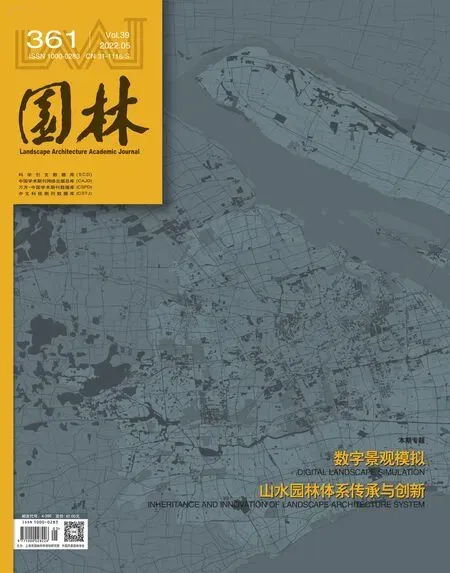Integrating Ancient and Modern Wisdom to Construct an Ideal Living Environment
Since the 21st century,especially under the tide of economic globalization,the situation we are facing has become more complex and changeable.Various intertwined ideas have been constantly colliding.Under the background of a new round of technological and industrial changes,how should landscape architecture respond to opportunities and challenges? Landscape architecture is the product of the development of human society to a certain stage,and it is a practical discipline that is constantly enriched and improved along with human construction activities and social development.Mr.WANG Juyuan wrote in the Chinese Encyclopedia,Architecture,Landscape Architecture and Urban planning:“Landscape architecture is a discipline that studies how to rationally use natural factors (especially ecological factors) and social factors to create a beautiful and ecologically balanced human living environment.” Throughout the development history of landscape architecture,the inheritance and development of ideological system,and the innovation and application of science and technology are important ways to deal with the new situation.
History is a mirror.On the one hand,the perceptual cognition of the practical wisdom of the ancestors is the concentrated embodiment of the spiritual needs of contemporary people to find identity and cultural identity.On the other hand,contemporary cutting-edge landscape methods and technologies empower landscape architects to understand and flexibly analyze and apply quantitatively in real time,so as to solve human settlement problems more efficiently and accurately,reflecting scientificity and rationality.Of course,it is not advisable to rely solely on data or technology.In the 1960s,the West relied on “A Method of Systematic Design” to promote the development of design to a rational and predictable process,and finally fell into the situation of rigid scientific methodology design.After reflection,it evolved into the “Designer Ways of Knowing” in the 1980s.The formation of the methodology of “Designer Ways of Knowing” marks the transformation and development of design methodology from the rigid scientific theory to the combination of scientific thinking,humanistic thinking and design thinking,as well as a seamless reconstruction of rationality and sensibility,science and art.Therefore,whether it is the direct drive of technical practice or the subtle infiltration of ideological system,the goal orientation is to create a good living environment.
This issue includes two topics:“Digital Landscape Simulation” and “Inheritance and Innovation of Landscape Architecture System”.Topic 1 discusses the renewal iteration and cutting-edge application practice of digital landscape technology,covering (1) landscape pattern optimization based on quantitative evaluation; (2) Analysis of landscape environmental behavior; (3) Simulation visualization analysis.Topic 2 reflects the contemporary interpretation,wisdom inheritance and construction practice of Chinese urban landscape thought,covering (1) tracing the origin of Chinese landscape culture and landscape thought; (2) Sorting out the development context of the ancient city’s human settlement environment; (3) The water management wisdom of the watershed cluster is analyzed.
Looking back to the past,the construction of living environment contains the rich survival wisdom and aesthetic experience of our ancestors,and reflects a relatively mature ideological system in terms of site selection,water system sorting and city construction;Looking at the present,with the help of digital landscape technology,it is possible to scientifically and accurately analyze the spatial characteristics of human settlements and their changing laws,and explore the digital transformation of landscape architecture in the future wisdom era.Today,the discipline of landscape architecture has richer profound connotations and broader extensions.Rather than swaying in the boundless waves of criticism,perhaps,we need to build our own ideal human settlement on the land on which we live.

